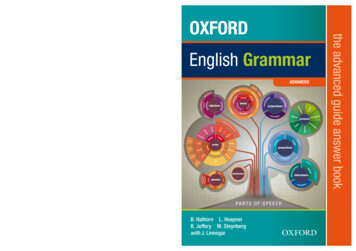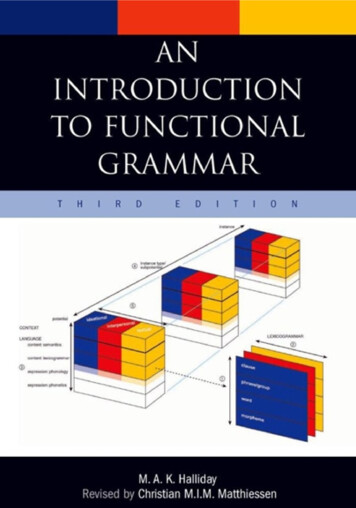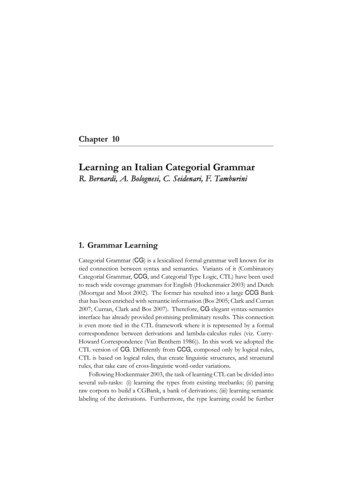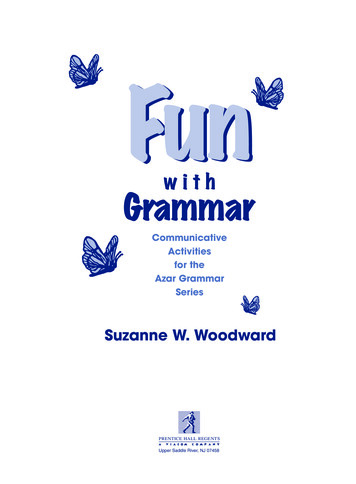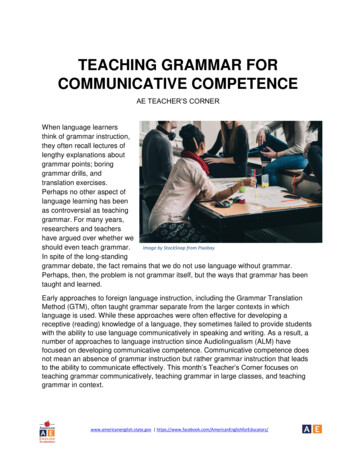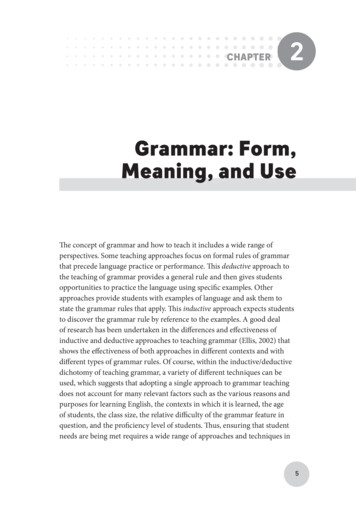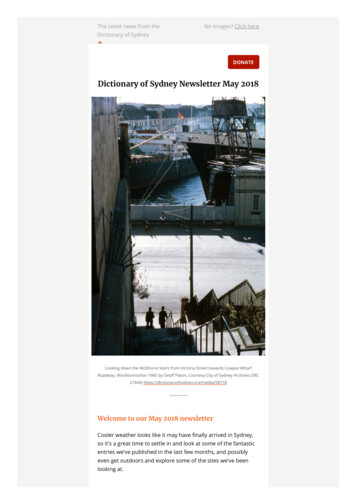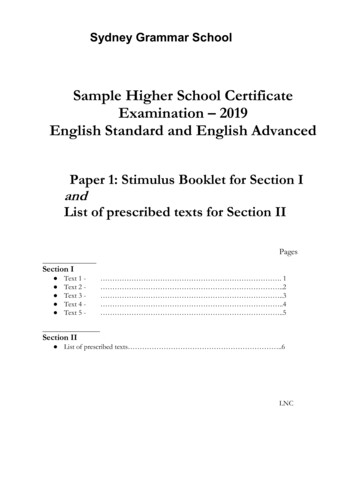
Transcription
Sydney Grammar SchoolSample Higher School CertificateExamination – 2019English Standard and English AdvancedPaper 1: Stimulus Booklet for Section IandList of prescribed texts for Section IIPagesSection I Text 1 Text 2 Text 3 Text 4 Text 5 - . 1 .2 .3 .4 .5Section II List of prescribed texts .6LNC
-1-Section 1Text 1 – Images
-2-Text Two – PoemBruce Dawe, “Drifters”One day soon he’ll tell her it’s time to start packing,and the kids will yell ‘Truly?’ and get wildly excited for no reason,and the brown kelpie pup will start dashing about, tripping everyone up,and she’ll go out to the vegetable-patch and pick all the green tomatoes from the vines,and notice how the oldest girl is close to tears because she was happy here,and how the youngest girl is beaming because she wasn't.And the first thing she’ll put on the trailer will be the bottling-set she never unpackedfrom Grovedale,and when the loaded ute bumps down the drive past theblackberry-canes with their last shrivelled fruit,she won’t even ask why they’re leaving this time, or where they’re headed for- she’ll only remember how, when they came here,she held out her hands, bright with berries,the first of the season, and said:‘Make a wish, Tom, make a wish.’Source: Dawe, B 1962, No Fixed Address, Cheshire, Melbourne
Text Three – Fiction extract-3-Extract from Alex Miller’s novel Landscape of Farewell (2007):[The protagonist of the novel is an elderly German man who is travelling in Australia with Dougald, an Aboriginalelder.]He lifted his hand and pointed. “There she is, old mate,” he said. “The Expedition Range.” Hedescribed with his outspread fingers the silvery lines that lay along the flanks of the great rock walls.“They are waterfalls,’ he said. “They’ve had good rains down this way.” He spoke as if there hadbeen no tension between us. I looked across at him and he turned to me and smiled, a youthfuldelight in his eyes. “This is it, old mate,’ he said.I saw how moved he was to see his country once again, and I envied him this reunion with his pastand wondered how I might have felt if such a reunion were possible for me. There was, of course,no place such as this that I might return to. Hamburg today is not the city in which I was born, noris it the place I grew up, but is a new construction, and the strange and beautiful countryside wheremy uncle had a farm, and where I encountered the gipsy girl, is no longer countryside but has beentransformed into suburban streets and schools and playgrounds and small, mean strips of parklandthat are supposed to have preserved something of the countryside for the new inhabitants but whichreally are no more than a parody of preservation. The sacred coppice* of my childhood has longsince been covered by concrete and asphalt.Seeing the look in Dougald’s eyes as he recognised the place of his boyhood, I understood what aunique privilege it was for him to experience the reassurance of this return after half a century to acountry unaltered by time and war and the developments of the twentieth century. It was still thecountry of his Old People, as he called his ancestors, the term familiar and intimate, as if they werenot remote beings whose individual features had been forgotten long ago, but were known to him,and were a people still in occupation of their lands. It was a term that seemed to suggest that theentire colonial enterprise might never have taken place, and that the old reality, like the Old Peoplethemselves, had not become extinct but had defied our belief in history and survived. The OldPeople, indeed, suggested to me another way of looking at reality and the passage of time than myown familiar historical sense of things, in which change and the fragmentation of epochs andexperience is the only certainty.The waterfalls did not reach the ground but joined together and became a pale drift of mist as theydescended, riding across the face of the cliffs like clouds of smoke, glowing pink and orange in thelate afternoon sun, touched here and there by the delicate hues of rainbows, the whole scene alteringas I observed it. As we drew close to the cliffs Dougald slowed and turned off the narrow dirt road.He eased the truck across a cattle grid and drove on in a low gear, at little more than a walking pace,following a meander of half-buried wheel ruts through open woodland towards the base of the stoneramparts. We were soon crossing a meadow dotted about with graceful trees, their black trunks andspreading canopies of slender leaves casting a delicate lacework of shadows on the untrodden grass.These stately trees might have been planted to grace the estate of a landowner hundreds of years inthe past. Dougald raised his hand and pointed to them. “Here’s your ironbarks, old mate.* wood or thicket of small trees or bushes-4-
Text Four – Non-fictionOur Parents Are Our Future by Cora FrazierPeople often ask me: How can we make sure our loved ones are prepared for life’s joys andchallenges? And my answer is always the same: You, the child, have to step back. You have to let go.You have to allow your parents to make mistakes – that’s the only way he or she will learn. You haveto let your parent get her heart broken by a man in her assisted living facility who she thinks isWarren Beatty*. You have to let your parent slip and fall on the playground when is wandering there,lost, after setting out on an errand he can’t recall. You have to let your parent give the wrong answer,because otherwise how well he or she ever really know who Ariana Grande is?You don’t want to smother your parent. She may be calling you several times a day, but, trust me, ifyou don’t pick up she’ll figure it out. He’ll remember the nine-digit numerical passcode to the Wi-Finetwork your brother installed. Or find a way to stop the home stair-lift from going up and down thestairs, over and over, while he is sitting on it. She is perfectly capable of turning off an accidentallytriggered burglar alarm herself, or with the help of the police, when they arrive.Many people think hovering and love are one and the same. That’s just not true. There’s a differencebetween inserting oneself and offering encouragement. There’s a difference between setting up aLinkedIn account for your parent and suggesting, “You should get on LinkedIn, Dad. No, notLinked On. Did you seriously think it was called LinkedOn? Ha ha ha, wait one sec – I have to textthat to Emily.”You can’t micromanage your parent. You have to sit back and let her file two tax returns for thesame year because she forgot she already filled one out. You can’t intervene every time your parentplants the entire bag of expensive chia seeds you gave her in her flower garden. And both of you willsee benefits. Be honest – it wouldn’t be so bad if the hour you spend every two weeks speaking to aparent could be redirected towards a more fulfilling hobby, like re-watching “Buffy the VampireSlayer” episodes while scrolling through a work spread-sheet.Some of my readers have written in to say that, if they adopted this approach they would feel like‘bad children’. Let’s ease up on the shaming language! The only truly ‘bad child’ is one who shelters aparent from important truths – for example, that the mailman’s name is nothing like Roger.When I am feeling down, I like to stop by the shuffleboard court at my local park. I watch the peopleplaying there, making slow, deliberate movements with the use of walkers or cranes, staring down atthe board for minutes on end, seemingly without comprehension, saying loudly to one another,“What?! What?!”I look at them and think the whole world is at their wrinkled fingertips! Then thesun appears through the clouds, the players aren’t sure whose turn it is, and I smile sadly, butproudly, knowing that, one day, they won’t need us anymore. And at the end of my life, if there’ssome sort of final judgement, I will look back and say, “Hey, if nothing else, I raised two adults whogrew all the way into feeble-minded octogenarians.”From The New Yorker, September 25, 2017*well-known actor and sex symbol of the 1970s.
Text Five – Drama extract-5-Extract from Eugene O’Neill’s play Long Day’s Journey Into Night (1941/1956):EDMUND: You’ve just told me some high spots in your memories. Want to hear mine? They’reall connected with the sea. Here’s one. When I was on the Squarehead square rigger, bound forBuenos Aires. Full moon in the Trades. The old hooker driving fourteen knots. I lay on thebowsprit, facing astern, with the water foaming into spume under me, the masts with every sail whitein the moonlight, towering high above me. I became drunk with the beauty and singing rhythm of it,and for a moment I lost myself – actually lost my life. I was set free! I dissolved in the sea, becamewhite sails and flying spray, became beauty and rhythm, became moonlight and the ship and the highdim-starred sky! I belonged, without past or future, within peace and unity and a wild joy, withinsomething greater than my own life, or the life of Man, to Life itself! To God, if you want to put itthat way. Then another time, on the American Line, when I was lookout on the crow’s nest in thedawn watch. A calm sea, that time. Only a lazy ground swell and a slow drowsy roll of the ship.The passengers asleep and none of the crew in sight. No sound of man. Black smoke pouring fromthe funnels behind and beneath me. Dreaming, not keeping lookout, feeling alone, and above, andapart, watching the dawn creep like a painted dream over the sky and sea which slept together. Thenthe moment of ecstatic freedom came. The peace, the end of the quest, the last harbour, the joy ofbelonging to a fulfilment beyond man’s lousy, pitiful, greedy fears and hopes and dreams! Andseveral other times in my life, when I was swimming far out, or lying alone on the beach, I have hadthe same experience. Became the sun, the hot sand, green seaweed anchored to a rock, swaying inthe tide. Like a saint’s vision of beatitude*. Like the veil of things as they seem drawn back by anunseen hand. For a second you see – and seeing the secret, are the secret. For a second there ismeaning! Then the hand lets the veil fall and you are alone, lost in the fog again, and you stumble ontoward nowhere, for no good reason! (He grins wryly.) It was a great mistake, my being born a man, Iwould have been much more successful as a sea-gull or fish. As it is, I will always be a stranger whonever feels at home, who does not really want and is not really wanted, who can never belong, whomust always be a little in love with death!TYRONE: (stares at him – impressed) Yes, there’s the makings of a poet in you all right.* supreme blessedness
-6-Section IIThe Prescribed Text is:George Orwell, Nineteen Eighty-FourEND OF STIMULUS BOOKLET
Sydney Grammar SchoolSample Higher School CertificateExamination - 2019English Standard and English AdvancedPaper 1: Texts and Human ExperiencesGeneral Instructions Reading time – 10 minutes Working time – 1 hour and 30 minutes Write using black pen A Stimulus Booklet is provided with this paperTotal marks:40Section I -20 marks (page 1)Attempt Questions 1 –Allow 45 minutes for this sectionSection II – 20(page 2)Attempt Question 1 OR 2Allow about 45 minutes for this sectionLNC
-1-Section I20 marksAttempt Questions 1 - 4Allow 45 minutes for this sectionYour answers will be assessed on how well you: demonstrate understanding of human experiences in texts analyse, explain and assess the ways human experiences are represented in textsExamine Texts 1, 2, 3, 4 and 5 in the Stimulus Booklet and then answer the questionsbelow.Question 1: Use Text 1 to answer the question (English Standard and EnglishAdvanced)Compare how the two images convey a paradoxical idea about the human experience oftravel.(4 marks)Question 2: Use Text 2 and Text 3 to answer the question. (English Advanced Only)Compare how Text 2 and Text 3 represent differing responses to place.(6 marks)Question 3: Use Text 4 to answer the question. (English Standard and EnglishAdvanced)Explain how the writer utilises language to examine the shared human experience ofcaring for parents.(7 marks)
Question 4:Use Text 5 to answer the question. (English Advanced Only)Explain how Text 5 explores the impact of nature on the sense of self.(3 marks)
-2-Section II20 marksAttempt Question 1 OR Question 2Allow 45 minutes for this sectionYour answer will be assessed on how well you: demonstrate understanding of human experiences in texts analyse, explain and assess the ways human experiences are represented in texts organise, develop and express ideas using language appropriate to audience,purpose and contextAnswer Question 1 OR Question 2EITHERQuestion 1: Analyse how the representation of power in Nineteen Eighty-Four shapes ourunderstanding of the individual and collective human experience.ORQuestion 2: How has your understanding of the challenges of human experience beenshaped by Orwell’s use of the dystopian novel form?END OF PAPER ONE
Extract from Eugene O ·Neill ·s play Long Day ·s Journey Into Night (1941/1956): EDMUND: You ·ve just told me some high spots in your memories. Want to hear mine? They ·re all connected with the sea. Here ·s one. When I was on the Squarehead square rigger, bound for Buenos Aires. Full moon in the Trades. The old hooker driving fourteen knots.
